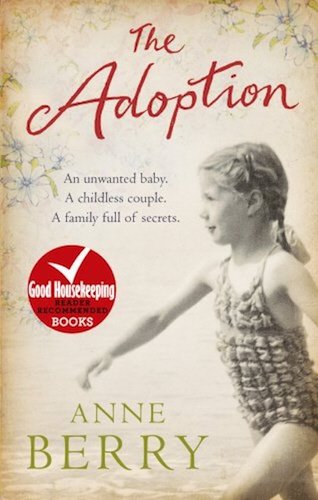NOBODY’S CHILD
Adoption is not an easy subject to talk about. The decision to leave a child in the hands of a stranger can never be taken lightly, and I know from the friends who made that choice, that it’s something they struggle to live with. The emotion it generates makes it an attractive subject for literature, although not every adoption novel can be described as good. Narratives are either more saccharine than an over sugared doughnut, or the plots are littered with the kind of one-dimensional characters that wouldn’t look out of place in an afternoon soap opera. Thankfully Anne Berry’s The Adoption doesn’t suffer from either of those traits. This is her third novel and it hooks the reader from start to finish thanks to some beautiful writing, excellent research, and a well-crafted story with skilfully handled plot twists.
The starting point is Bethan, a young Welsh girl whose “crime” is to fall in love with a German POW working on her father’s farm. Theirs is a dangerous liaison in more ways than one. In a small rural community heaving under the strain of World War 2, sexually “associating” with the enemy is the equivalent of treason. Bethan is forced to put their daughter up for adoption after she finds out she’s pregnant, and it is Harriet and Merfyn, a childless, God fearing couple who raise her.
Sadly, for baby Lucilla they are the worst kind of parents a new-born could have, not because they’re cruel but because they are inflexible with a black and white view of the world. Lucilla’s spiritedness doesn’t stand a chance against a hypocritical father and a mother with a twisted ideal of daughterly perfection. In Harriet’s eyes Lucilla is a lost cause because she will never be girly, while her foreign roots sit uncomfortably with a woman whose parents were the victims of German aggression. These two are stuck with each other in the worst possible way, and what subsequently follows is the painful yearning of a child wanting to be loved and a “mother” who goes through the motions of parenting. As Lucilla slips out of adolescence into womanhood, her estrangement from Harriet is complete as the desire to find her biological mother intensifies. The search is initially sporadic although it is fervently pursued after Harriet’s death and when Lucilla becomes a grand-parent. There are no happy endings as such, just the harsh realisation that time doesn’t necessarily heal although it can deliver consolations. Without spoiling the ending, Lucilla has every reason to hope.
This is a book with a major theme and complex layers that heighten the underlying drama. A badly handled adoption irrevocably changes the lives of three women, with the fallout running like a scar through the generational lines. Whatever we may think of Bethan, Harriet, and Lucilla we should judge them as the victims of circumstance. It was a war that brought them together unleashing its own set of consequences, in much the same way that the flutter of a butterfly’s wings allegedly triggers earthquakes. Chaos is the thread, yet redemption is never far away.
The Adoption is unflinchingly honest with writing that has a powerful, haunting quality. The characters are also vivid, while the narrative is tinged with a bitter/sweet edge that allows the reader to hear the voices of real people, not clichés, and although Harriet is unlikable we grudgingly forgive her because she genuinely doesn’t know any better. However, there is one question that demands an answer. What happened to Thorston, Lucilla’s biological father? Perhaps it could be answered in a sequel.
Reviewed by Juliette Foster
© Archant Community Media Limited used under limited licence




